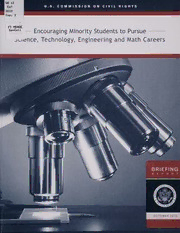
Encouraging minority students to pursue science, technology, engineering and math careers : a briefing before the United States Commission on Civil Rights held in Washington, D.C PDF
Preview Encouraging minority students to pursue science, technology, engineering and math careers : a briefing before the United States Commission on Civil Rights held in Washington, D.C
Qfl 13 U.S. COMMISSION ON CIVIL RIGHTS . E47 2010 Copy 2 FT MEADE — Encouraging Minority Students to Pursue- GenCo 11 ence, Technology, Engineering and Math Careers JLI £/\7L OCTOBER 2010 U.S. COMMISSION ON CIVIL RIGHTS MEMBERS OF THE COMMISSION The U.S. Commission on Civil Rights is an independent, bipar¬ Gerald A. Reynolds, Chairman tisan agency established by Congress in 1957. It is directed Abigail Thernstrom, Vice Chair to: Todd Gaziano • Investigate complaints alleging that citizens are being Gail Heriot deprived of their right to vote by reason of their race, color, Peter N. Kirsanow religion, sex, age, disability, or national origin, or by reason Arlan D. Melendez of fraudulent practices. Ashley L. Taylor, Jr. • Study and collect information relating to discrimination or a Michael Yaki denial of equal protection of the laws under the Constitution because of race, color, religion, sex, age, disability, or Martin Dannenfelser, Staff Director national origin, or in the administration of justice. • Appraise federal laws and policies with respect to discrimi¬ nation or denial of equal protection of the laws because of U.S. Commission on Civil Rights race, color, religion, sex, age, disability, or national origin, or 624 Ninth Street, NW in the administration of justice. Washington, DC 20425 ■ Serve as a national clearinghouse for information in respect to discrimination or denial of equal protection of the laws (202) 376-81 28 voice because of race, color, religion, sex, age, disability, or (202) 376-8116 TTY national origin. www.usccr.gov ■ Submit reports, findings, and recommendations to the President and Congress. ■ Issue public service announcements to discourage discrimination or denial of equal protection of the laws. This report is available on disk in ASCII Text and Microsoft Word 2003 for persons with visual impairments. Please call (202) 376-8110. Encouraging Minority Students to Pursue Science, Technology, Engineering and Math Careers A Briefing Before The United States Commission on Civil Rights Held in Washington, DC Briefing Report Letter of Transmittal The President The President of the Senate The Speaker of the House Sirs and Madam: The United States Commission on Civil Rights (“Commission”) is pleased to transmit this report. Encouraging Minorities to Pursue Science, Technology, Engineering and Math Careers. A panel of experts briefed the Commission on September 8, 2008, on possible reasons that minority students who begin college intending to major in science, technology, engineering or math (“STEM”) leave these disciplines in disproportionate numbers before graduation. They also discussed possible ways to improve the retention of these students in STEM degree programs. Based on that briefing, the Commission developed the findings and recommendations that are included in this report. The Commission found that regardless of their racial or ethnic backgrounds, college freshmen show equally substantial degrees of interest in STEM careers. Despite similar levels of interest, the Commission found that black and Hispanic students are ultimately less likely to major in or obtain doctoral degrees in STEM disciplines than are whites and Asians. Data presented to the Commission indicated that racial and ethnic discrimination in college is not a substantial factor in these disproportionate STEM attrition rates. It found that academic mismatch—one consequence of some schools’ racially and ethnically preferential admissions policies—is an important reason for these disparities, however. For example, data indicate that success in STEM majors depends both on a student’s absolute entering academic credentials and his or her credentials relative to other students in his or her classes. When black and white students have the similar academic credentials black students are actually more likely than their white counterparts to obtain STEM degrees. Thus, the Commission ascribed the higher minority7 attrition from STEM programs to credentials gaps or “mismatch” stemming in part from racially preferential admissions policies. The Commission recommended that selective colleges not admit any STEM student with a large deficit in academic credentials relative to its STEM median without fully informing that student of the potential impact of such deficit on that student. Such disclosure should include the school’s record of graduating students with similar academic credentials in STEM majors. Similarly, the Commission urged high school guidance counselors to advise students about the impact of large deficits in academic credentials on success in a particular college’s STEM program. It further noted that well-designed academic support programs can sometimes help students with modest deficits in credentials to succeed in STEM programs and advised schools to implement the best practices employed by such programs and make admitted students aware of their availability. Part A, which consists of the body of this report, was approved on June 11, 2010 by Chairman Reynolds and Commissioners Gaziano, Heriot, Kirsanow and Taylor. Vice Chair Themstrom abstained, and Commissioner Yaki voted against. Vote tallies for each of the Commission’s findings and recommendations, which make up Part B of the report, are noted therein. Table of Contents Executive Summary.1 Findings and Recommendations.3 Summary of Proceedings.7 Richard Sander. 7 Richard Tapia.21 Rogers Elliott.22 Thomas Fortmann.26 Robin Willner.27 Discussion.29 Statements.37 Richard Tapia.37 Rogers Elliott.44 Thomas E. Fortmann.68 Robin Willner.71 Speaker Biographies.75 Richard Sander.75 Richard Tapia.75 Rogers Elliott.75 Thomas Fortmann.76 Robin Willner.76 Commissioner Statements and Rebuttals.77 Statement of Commissioner Gail Heriot.77 Statement of Commissioner Ashley L. Taylor, Jr.93 Dissent of Commissioners Michael Yaki and Arlan D. Melendez.94 Joint Rebuttal of Commissioners Gail Heriot, Peter Kirsanow and Todd Gaziano.96
